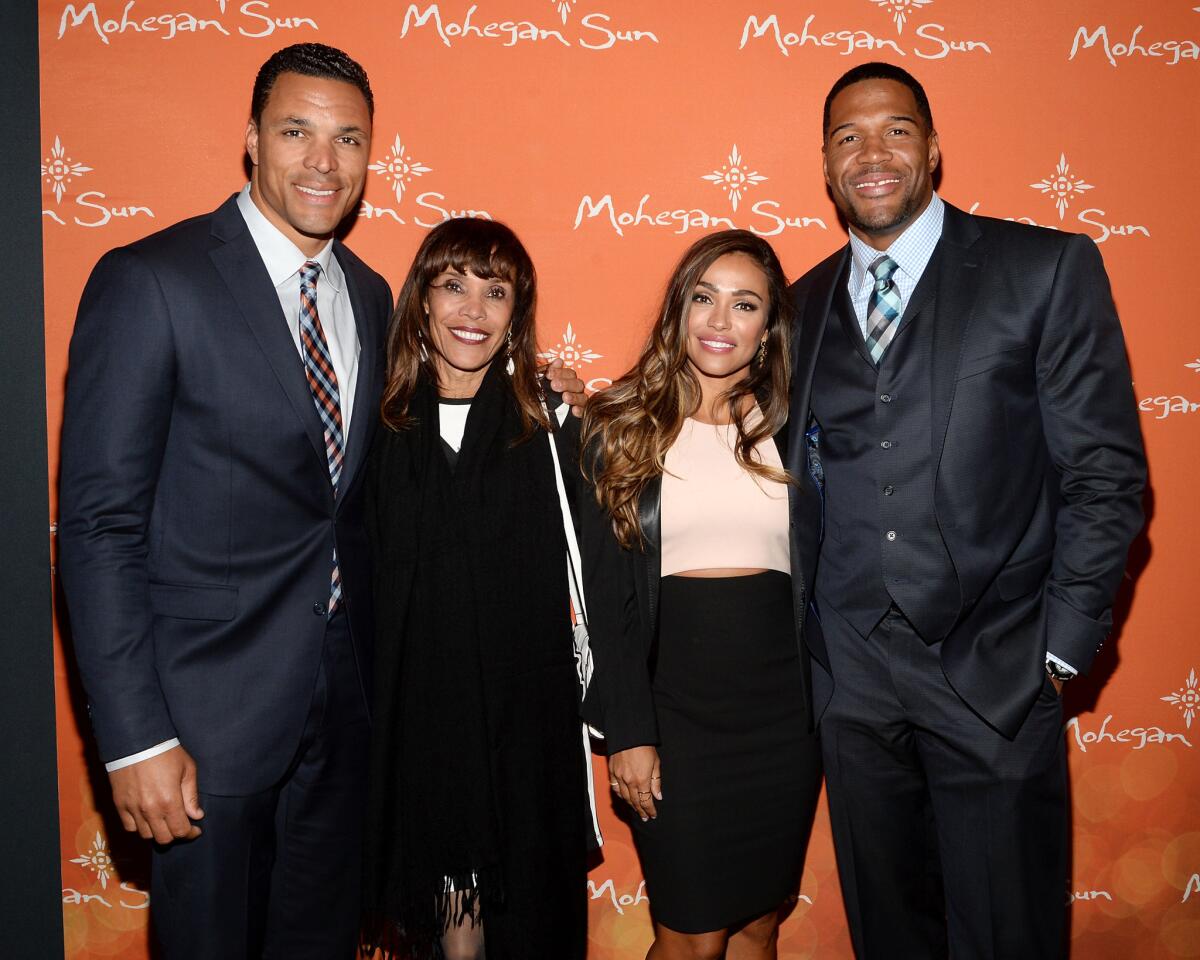Tribeca: In Tony Gonzalez doc, family subtleties amid NFL grandeur

- Share via
Reporting from NEW YORK — For 17 years in the NFL, tight end Tony Gonzalez went out and made leaping, athletic catches every Sunday, in the process becoming one of the most legendary offensive players of the modern era.
That story is well known to football fans. Less commonly thought of is Gonzalez’s personal life, which included a brother who turned the star on to football but heartbreakingly never played professional ball himself, and a stepfather who died just before Gonzalez’s penultimate season.
Those characters and the larger Gonzalez family developments are followed in an uncommonly close-up way in “Play It Forward,” Andrea Nevins’ intimate and moving new documentary about the Southern California family that opened the Tribeca/ESPN Film Festival on Thursday night.
Produced by fellow ex-NFL-er and current morning-show host Michael Strahan (he had been working on another film about athletes’ post-career lives and “pulled this story out of that story,” he said at the screening), “Play It Forward” examines not only a pair of football-playing brothers but more profound questions about fate and success.
As young boys growing up in Torrance, it was Chris, not Tony, who loved football, and Chris who embraced the finer points of the game that his brother would only later reluctantly come to appreciate. Chris Gonzalez was a talented athlete, a cerebral presence on the football field who encouraged his sibling, his junior by two years, to take up the game.
But Chris Gonzales was in a bad car accident as a young man and never rose above the community college football level. Instead he began living vicariously through Tony, struggling to find his own career and place in the world. He is most at peace, it seems, when helping a Gonzales play football—Tony early in life and then, in some of the film’s most sensitive moments, when he begins to work out Tony’s pre-adolescent son Nikko in a similar manner later on.
Tony Gonzalez has some frustrations too. Despite a career that was record-setting by almost any standard, as his 16th season opens he has never won a playoff game, let alone been to a Super Bowl.
Hovering over both boys is the presence of Michael “Pop” Saltzman. Growing up, the Gonzalez boys’ biological father was not present; instead their mother married Saltzman when her children were just 11 and 13, and he went on to became an important figure in their lives. Saltzman can be felt in the film primarily through audio recordings he made as he lay in a hospital dying in the spring of 2012, offering advice to his sons and worrying to Tony that Chris’ happiness is too tied up with his brother’s career.
If the film lacks the exceptional elements that make up many a sports doc—there seems to be little tabloid- or headline-worthy about Gonzalez’s family life--it compensates for it with a remarkably human story. The film ultimately boils down essential questions as it documents with poignancy the frustrations and ghosts of even a seemingly well-off group. Almost every family grapples with issues like dreams deferred, less successful siblings and recently departed relatives. The Gonzalez family may be undergoing a particularly high-voltage version of these issues, but their story will resonate widely.
What makes “Forward”--which is seeking U.S. distribution at Tribeca--particularly notable as a film is the access we get to the Gonzalez family, literally and emotionally. Every sign of jubilation and disappointment is etched on Chris Gonzalez’s face as he and family members sit in various stadiums living vicariously through their relative; every hope and letdown is registered as we ride sidecar with Tony Gonzalez on his turbulent season.
Asked at a Q&A after the screening what it was like to be so closely followed, Tony Gonzalez said that he had been concerned but ultimately thought there was a story to tell, particularly about the little-seen and rarely understood idea of an athlete’s entourage. “You feel vulnerable a lot of the times [making a movie] but if you’re going to do it I want people to see the real, what it’s like to go out and play professional football,” he said, and think of “all the other players and their village.”
Strahan added the film was “for all the people along the way…that the public doesn’t know about. They think it’s just you and it’s not.”
Tony Gonzalez seems to have accomplished all he could have ever hoped for, yet postseason success eludes him, and the idea of walking away without that brass ring haunts him frequently. It’s here that the film is eminently relatable; most of us have little notion of what it’s like to make a fingernail catch as a linebacker slams us to the ground in front of 90,000 screaming fans. But the idea of being forced to give up a dream will be instantly recognizable.
Nevins said she was inspired to make the movie as she watched her father, a successful surgeon, contemplate and then undertake retirement a number of years ago. “It was difficult to imagine” she said, recalling that his profession was so tied up with his life that it almost hurt to think about him giving that up. “Really,” she said, “it’s football as metaphor.”
Twitter: @ZeitchikLAT
More to Read
Only good movies
Get the Indie Focus newsletter, Mark Olsen's weekly guide to the world of cinema.
You may occasionally receive promotional content from the Los Angeles Times.











